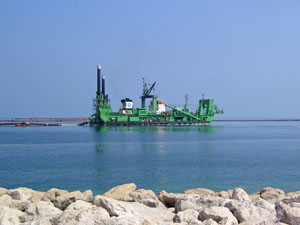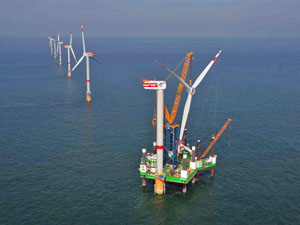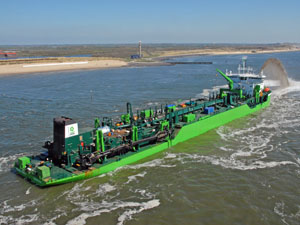New assignments worth 655 million Euro on all continents for Belgian DEME Group so far in 2009
Since the beginning of 2009, Antwerp-based Dredging, Environmental and Marine Engineering (DEME) group has won new orders for a total amount of € 655 million, geographically spread over all continents.
In the Americas, new contracts were obtained in Canada, Venezuela en Brazil.
In Soyo, in the North-Western part of Angola near the river Congo, we have been awarded by Acergy and Entrepose/Spie Capag a contract for the construction of the landfall for two gas pipelines and two river crossings.
Source: DEME Group, 27 May 2009
The orders came in through DEME operating companies Dredging International, GeoSea, Tideway and DEME Environmental Contractors (DEC).
The figures prove that DEME remains a world player in all its specialist activities – even in times of a global downturn.
As a consequence, DEME’s order book which amounted to € 2,2 billion at the end of 2008, has remained at the same high level – in spite of having written off the Port Rashid project in Dubai.
The variety of assignments and disciplines is quite distinctive.
The fact that a diversity of dredging and marine plant is involved, is another sign that activities are healthy spread.
An outline of this important € 655 million package of new orders includes the following:
Middle East (300 million Euro)

The works have to be executed for the account of Abu Dhabi Oil Refining Company (TAKREER) under an EPC lump sum turnkey contract for a total amount of USD 346 million (€ 300 million).
The works have to be completed in a period of 21 months, that is by Spring 2011.
A number of dredgers of the DEME-fleet will be involved in the execution of the project.
The contract is package 5 of an overall 7-package project to construct a new 400,000 bpd Refinery in Ruwais, to operate alongside Takreer’s existing 417,000 bpd facility.
The entire refinery construction is scheduled for completion and start up by the first quarter of 2014.
Once completed, the refinery will increase petroleum production at the site by 2.7 million tonnes a year to 5.3 tonnes a year.
It will also produce 1.1 million tonnes a year of petrochemical feedstock propylene.
For Dredging International the site preparation works include dredging and pumping ashore of 42 million m3 to create the refinery site platform.
The works will involve the mobilisation of several heavy-duty cutter suction dredgers and trailing suction hopper dredgers, booster stations, spreader pontoons etc.
The actual works will start on 7th June 2009.
In 2008, Dredging International completed a first contract for Takreer on the Ruwais refinery site that involved dredging of an access channel and turning basin for the Ruwais Sulphur Expansion Project.
Americas (100 million Euro)
Major highlight is Brazil, where DEME’s environmental subsidiary company DEC (DEME Environmental Contractors) signed an important contract to clean up harbour sites in the Brazilian harbour city Santos with Brasil Terminal Portuario, a Brazilian terminal operating company whose main customer will be shipping company MSC.
The contract is valued at € 75 million.
Because of its experience with large-scale environmental orders and using a constructive and innovative all-in approach, DEC managed to win this project, despite strong competition.
This order fits the company's policy of sustainable development, which the DEME group uses as guiding principle for its strategy.
The order consists of remediating the Santos harbour site, where an illegal dump was created during the past years.
This is a turnkey project, which means that DEC not only guarantees its implementation but also designs the concept and arranged the financing and the accompanying guarantees, in good cooperation with the Belgian National Delcredere Service (ONDD), Fortis Bank and the terminal investment company of the MSC group.
The sites are at the edge of a bay, making the substratum unstable.
The dumped material leaches into a river and further into the sea.
All together this contaminated soil covers an area of 45 ha.
The remediation requires processing 680,000 m³ of domestic and industrial waste.
Part of this is highly contaminated waste.
Brasil Terminal Portuario will later build a container terminal on the remediated site.
DEC won the order through its innovative approach.
In addition to its experience with similar large orders abroad, including remediating the site for the London Olympics, three points in DEC's proposal were decisive in beating the competition:
1. The major part of the 680,000 m³ soil to be remediated will be recycled by DEC and will be employed in useful reuse in the building of the container terminal.
Of the 680,000 m³ DEC will only have to store a fraction of what is left over: about 100.000 ton.
2. Applying a patented technique of soft soil improvement at the spot where the illegally dumped waste reaches into the water and is unstable.
In this case the soil stays in place and cement columns are driven into the soil under high pressure.
This way the side walls of the dump are protected from further leaching.
3. DEC itself helped arrange financing of the project.
This is done by Fortis and is guaranteed by the National Delcredere Service.
Proving once again that the ONDD's constructive attitude has a strong export-promoting effect for Belgian companies.
The contract is worth € 75 million and offers work for almost two years.
For this project, DEC will invest in additional equipment, such as a soil separation and soil washing installation and equipment for soft soil improvement.
Now that the remediation concept has been approved, the permits will be applied for in the coming months.
In July/August equipment and machines will be mobilized and the work will start before the end of the 2009.
Because of agreements on building the container terminal, the soil remediation must be finished within 104 weeks.
Because of its large scale the project in Santos represents a real breakthrough by DEC on the international markets, now also outside of Europe.
The project also proves that DEC is able to provide turnkey projects in the far reaches of the earth.
For the DEME group the order is a new illustration of the fact that even in the current economic environment, very important investments are being won on international markets.
The Santos project again underlines the increasing importance of Latin America for DEME.
The group recently already has been active in Brazil, Argentina, Venezuela, Panama and Mexico.
Through its subsidiary Dredging International, DEME is already performing similar-sized environmental remediation in the Pasig River in Manila in the Philippines.
The environmental order in Santos emphatically fits in a series of projects in sustainable development.
Europe (120 million Euro)

This synergy is a very strong trump for DEME, particularly for offering global solutions in the very specific segment of offshore wind farms.
At the Alpha Venturs offshore wind turbine farm, which is the first major pilot project in Germany, DEME company GeoSea has been awarded the contract for the positioning of foundation piles (pre-piling).
In addition, 6 x 5 MW turbines have to be put on jackets, some 40 km at sea north of Borkum and in water depths of 25 to 30 m.
For this project GeoSea will assign its jumbo jack-up platform Goliath, which will be christened in Antwerp on 6th August.
Goliath will have a useful surface of 55.5 x 32.2 m and a maximum capacity of 1,600 tonnes.
Spuds have a length of 80 m.
In its specific market segment of diversified offshore marine works, this newest jack-up platform will be the biggest in the world.
An increasing number of pilot projects for offshore wind turbine farms is coming to market in Europe.
In this field, DEME is very well positioned by pooling the combined strength of several of its operating companies, particularly GeoSea, Scaldis and Tideway.
This combination of companies has received several contracts for pre-piling, jacket installation works, and precision stone placement at wind farm projects in the Irish Sea and off the coast of Walney Island.
On behalf of RWE, GeoSea also carried out geotechnical investigations for the Gwynt y Mor offshore wind turbine farm in the Irish Sea.
Having successfully carried out the first phase of C-Power’s Thornton wind turbine farm off the Belgian coast, DEME companies have indeed obtained valuable references in the market segment of green energy.
Meanwhile, the first phase at Thornton has been completed and 6 x 5 turbines are feeding in in the Belgian grid.
Other assignments in Europe include Russia, where the second phase of dredging and reclamation works must be carried out in the new harbour of Ust-Luga, near St.-Petersburg.
Also in Russia DEME offshore specialist Tideway, in joint-venture, has received an order for precision stone placement as pre-lay for the installation of Nordstream, the two 1220 km gas pipelines that will link Russia with Germany through the Baltic Sea.

This contract is already being executed by the jumbo hopper dredger Pearl River.
This project fits in the Dutch Delta II strategy, which will undertake direct measures in the frame of fighting global warming, to improve protection against swell and mid-sea level rise.
Finally, several other new contracts in Europe were booked in Georgia, Germany, Sweden, Great-Britain and Italy.
Africa (135 million Euro)
The works will start this month and will be executed with a trailing suction hopper dredger.
New assignments were also booked in Ghana, South Africa and Libya.